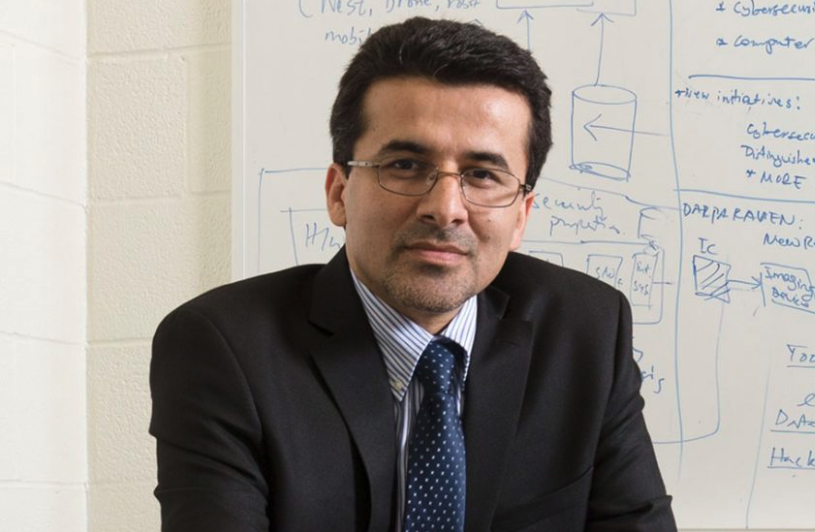The Florida Institute for Cybersecurity (FICS) Research is well-known and regarded as a global leader in hardware security and systems security research. FICS Research Director, Dr. Mark Tehranipoor, is generally acknowledged as the father of hardware security, in many cases having created the first programs, books, publications, and conferences in the domain.
While high-powered, high-dollar research is certainly one of the main thrusts of FICS Research’s activities, there is another that garners less recognition—workforce development. Many of the centers and initiatives led by FICS Research partner specifically with industry giants in the field, and strive to develop a skilled workforce prepared to excel in the hardware security space. Certainly, as hardware-based cyberattacks become more prevalent and the global economic outlook continues to be uncertain, the emphasis on skills and job creation in industry is an area where FICS Research’s efforts significantly impact the real world. The close collaborations between FICS Research and industry will certainly prove fruitful for students as they graduate and consider the next phase of their careers.
As the summaries below illustrate, real-world partnerships with industry leaders and government and workforce creation are integral to many of the activities at FICS Research.
Automated Implementation of Secure Silicon (AISS)
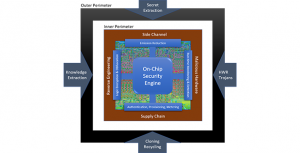 Automated Implementation of Secure Silicon (AISS) is a close collaboration between FICS Research and the Defense Advanced Research Projects Agency (DARPA). Leading electronic design automation company Synopsys will serve as a prime contractor on the program. The $7.8M grant, part of the DARPA Electronic Resurgence Initiative (ERI), aims to make scalable on-chip security pervasive throughout industry and military applications.
Automated Implementation of Secure Silicon (AISS) is a close collaboration between FICS Research and the Defense Advanced Research Projects Agency (DARPA). Leading electronic design automation company Synopsys will serve as a prime contractor on the program. The $7.8M grant, part of the DARPA Electronic Resurgence Initiative (ERI), aims to make scalable on-chip security pervasive throughout industry and military applications.
Dr. Tehranipoor serves as lead PI for this project.
CYAN & MEST Centers
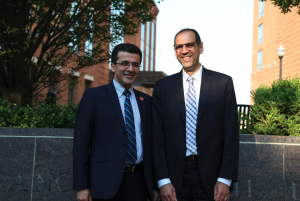
The Herbert Wertheim College of Engineering at the University of Florida and The Ohio State University College of Engineering collaborated to form two Centers of Excellence (COE) sponsored by the Air Force Office of Scientific Research (AFOSR), Air Force Research Laboratory (AFRL), and Nimbis Services, a developer of collaborative cloud communities. Their dual goals are to advance the area of hardware-enabled cybersecurity through innovation and development of new Analog and Mixed Signal (AMS) domain security and to provide a comprehensive workforce training and education program in areas related to microelectronics design and security.
The Center for Enabling Cyber Defense in Analog and Mixed Signal Domain (CYAN) was created with a $5 million grant from AFOSR as well as an additional $3.4 million from the joint universities. Dr. Waleed Khalil, associate professor of Electrical and Computer Engineering at Ohio State and Dr. Mark Tehranipoor, the Intel Charles E. Young Preeminence Endowed Chair Professor in Cybersecurity at UF, will serve as co-directors of the CYAN COE.
MEST, also hosted jointly at UF and OSU, will focus on developing a holistic, well-rounded training program in microelectronics security. Drs. Tehranipoor and Khalil will serve as co-directors of the MEST Center as well.
“The centers will function as a main platform to attract and retain a large pool of domestic graduate and undergraduate students in the field of AMS domain security,” said Dr. Khalil. “Students and engineers in our programs will be trained across multiple disciplines covering hardware security, algorithms, and data analytics, as well as AMS design and measurements, which will allow them to have a large toolbox from which to solve diverse problems.”
[ Learn More ]
ECI-Transition Center (TC)
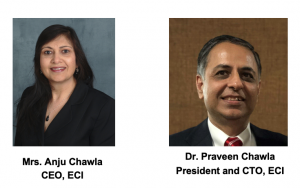 FICS Research and Edaptive Computing Inc. have established the ECI-TC Transition Center, which is using automation, computer vision, and machine learning to test and verify the designs of microelectronics in all phases of the lifecycle. This work will verify that hardware (IoT devices, chips, circuit boards, systems) has been manufactured to the exact specifications of the designers, that the system does not suffer from any hardware related vulnerabilities, and that the designs themselves have not been compromised in any way.
FICS Research and Edaptive Computing Inc. have established the ECI-TC Transition Center, which is using automation, computer vision, and machine learning to test and verify the designs of microelectronics in all phases of the lifecycle. This work will verify that hardware (IoT devices, chips, circuit boards, systems) has been manufactured to the exact specifications of the designers, that the system does not suffer from any hardware related vulnerabilities, and that the designs themselves have not been compromised in any way.
A second goal of the center is to educate professionals, graduate students, and undergraduate students about microelectronic design and security, and prepare them for the next generation of electronics devices and systems to be designed and fabricated in the United States. In support of this second goal, students affiliated with the center will be able to work as employees of ECI and will have a full-time offer from ECI upon graduation.
Dr. Tehranipoor will serve as director of the center, and ECE Assistant Professor Farimah Farahmandi will serve as associate director.
[ Learn More ]
Hardware Security Certificate
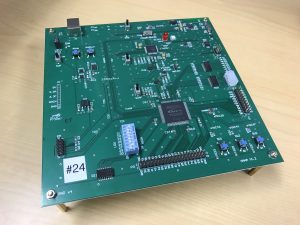 Students and professionals alike are able to become experts in the field of hardware security by completing a unique certificate program created by FICS Research, ECE Florida’s Hardware and Systems Security (HSS) certificate.
Students and professionals alike are able to become experts in the field of hardware security by completing a unique certificate program created by FICS Research, ECE Florida’s Hardware and Systems Security (HSS) certificate.
The HSS Certificate is a distinctive offering that provides comprehensive training and education on all aspects of hardware security and its interaction with software and systems security. This certificate program, available to UF students and working professionals, is delivered completely online, enabling participants to study at their own pace—any time, anywhere. Students will be awarded the certificate after successfully completing three online courses.
[ Learn More ]
STAMP: A Holistic Backward/Forward Trust Framework for Protecting Microelectronics Throughout Lifecycle
Jointly carried out between UF FICS Research and the Ohio State University, the goal of STAMP is to build an end-to-end Security and Trust (S&T) protection framework which starts with compiling detailed S&T specifications (threat models and their associated metrics). Guided by these specs, potential threats are progressively addressed on the different design and implementation phases. This holistic solution guarantees two important objectives: (1) Implementing countermeasures in a consistent and integrated manner, in which securing the design in one phase is not compromised by a subsequent phase; (2) Providing the most efficient S&T solutions with minimum drawbacks on other design parameters. The team illustrates the potential of the proposed methods by applying them to industrial-level SoCs and verifies the efficiency of the proposed research by assessing the S&T specs on the fabricated SoC chips (called hereafter the Trust-Vehicles “TVs”).
Center for Aerospace Resilience (CAR)
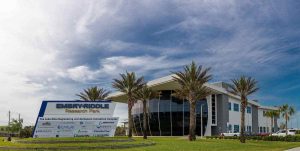 Dr. Tehranipoor and Dr. Remzi Sekar of Embry Riddle Aeronautical University (ERAU) recently gained sponsorship from the Florida Department of Education to establish a joint center between ERAU and UF called the Center for Aerospace Resilience (CAR). Though in its early stages, the center’s mission is to investigate innovative technologies for resilience computing in space, soft-error protection, fault injection assessment of space devices and systems, digital twin for managing the avionics supply chain, security protocols for drones, and more.
Dr. Tehranipoor and Dr. Remzi Sekar of Embry Riddle Aeronautical University (ERAU) recently gained sponsorship from the Florida Department of Education to establish a joint center between ERAU and UF called the Center for Aerospace Resilience (CAR). Though in its early stages, the center’s mission is to investigate innovative technologies for resilience computing in space, soft-error protection, fault injection assessment of space devices and systems, digital twin for managing the avionics supply chain, security protocols for drones, and more.
The initial proposal has been accepted, with a first-year funding of $1.75M. Given the aerospace industry’s strong presence in the state of Florida, CAR graduates will be well-positioned to fill the anticipated job openings (currently 2,000 and expected to grow).
Trust-Hub
 Trust-Hub Phase III, led by Dr. Tehranipoor, has been accepted for funding by the National Science Foundation (NSF). The stated purpose of Trust-Hub, created in 2010, is to:
Trust-Hub Phase III, led by Dr. Tehranipoor, has been accepted for funding by the National Science Foundation (NSF). The stated purpose of Trust-Hub, created in 2010, is to:
- Create a forum for the exchange of ideas, benchmarks, platforms, tools, and educational resources
- Develop and evaluate technologies in the domain of hardware security and trust
- Learn from course materials, publications, presentations, tutorials, and more
- Provide the community with access to tools, benchmarks, database, teaching materials, courses, and more

